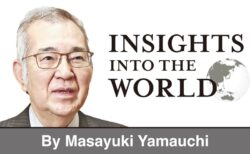17:17 JST, April 28, 2022
No end is in sight for Russia’s invasion of Ukraine.
Article 2 of the United Nations Charter stipulates that all U.N. members “shall settle their international disputes by peaceful means” and “refrain in their international relations from the threat or use of force.” These obligations are the most important agreement humankind has hammered out after the scourge of the two world wars. Russia’s behavior tramples on them and must never be forgiven.
At the same time, it should be noted that similar cases are not uncommon in history.
The fragile framework for international cooperation that came into effect after World War I was damaged by the Manchurian Incident, which was triggered by Japan in September 1931. At the time, the nationalist Republic of China put up weak resistance at best and the then-great powers were too busy battling the Great Depression at home to intervene in the East Asian conflict.
Even when a war broke out between Japan and China in July 1937 and soon expanded into a full-scale one, the United States did not impose sweeping sanctions against Japan until its July 1939 notice to the Japanese government that the Japan-U.S. Treaty of Commerce and Navigation had been allowed to lapse.
In Europe, Germany began stationing its troops in the Rhineland, a demilitarized zone in the west of the country, in March 1936. Germany annexed Austria in March 1938 and following the Munich Agreement of September 1938 that was signed by Germany, Britain, France and Italy, it incorporated the Sudetenland of Czechoslovakia into the Nazi state. The policy of appeasement toward Germany ultimately failed to prevent World War II from starting in September 1939.
Fast forwarding to recent history, Russia invaded Georgia in 2008, recognizing the Moscow-backed breakaway region of South Ossetia as an independent state. In 2014, it annexed Crimea from Ukraine and set off conflict in eastern Ukraine. The West’s response to each of those events was lukewarm. Moreover, partisan divisions in the United States and U.S. President Joe Biden’s missteps in Afghanistan in 2021 led Russian President Vladimir Putin to assume that an invasion of Ukraine would be an easy endeavor.
In other words, the post-World War II world had been exceptionally stable until recently. It is necessary for international society to stay prepared for similar crises, on the premise that such emergencies will continue to recur.
Respond strongly
What lessons should we learn from Russia’s ongoing invasion of Ukraine?
First, we should not make light of small-scale invasions. As mentioned above, the West mounted a weak opposition to Russia’s actions, including its annexation of Crimea.
Second, each nation should fundamentally defend itself. Some Japanese people say Ukraine is under invasion because it is not a member of the North Atlantic Treaty Organization but that they are sure the United States would come to the defense of Japan under the Japan-U.S. alliance. However, we should ask ourselves if the United States would really help Japan if it was subject to a small-scale invasion, for instance. No one knows the answer. But it is clear that a foreign nation or nations would not help Japan unless we fought very hard to defend ourselves.
Third, invasions must not be shrugged off. Even though the invasion of Ukraine is deeply harming Russia itself, Moscow is not likely to concede defeat and withdraw its troops from Ukraine.
Rather, it might not end the offensive until it can annex the two pro-Russian regions in eastern Ukraine, a development that might prompt it to unilaterally declare the war is over. If this occurs, those regions are unlikely to ever be returned to Ukraine. History shows that an armistice line agreed upon to avert a major war tends to end up as a demarcation line separating the areas effectively controlled by each party at the time of the agreement. This means that a setback in the early phase of a war is prone to entail a territorial surrender.
In postwar Japan, many people insisted that it was meaningless for the nation to arm itself with conventional weapons in the era of nuclear weapons. However, the possession of conventional weapons was and remains crucial for Japan. It is especially necessary to have the ability to launch counterattacks to the extent sufficient to deter an invasion of Japan. As I wrote in the April 2021 issue of the monthly magazine Chuokoron, Japan should declare its resolve to retaliate against any enemy attack and maintain a level of counterattacking power that is sufficient to inhibit an enemy from engaging in aggression against it.
Fourth, Japan should keep strengthening its partnerships with other nations of the free world. Many nations are now supporting Ukraine. Germany, for example, has embarked on bold military assistance measures for Ukraine, including supplying weapons. In early March, Japan airlifted bulletproof vests to Ukraine. This assistance was said to be the most Japan could do under the so-called Three Principles on Transfer of Defense Equipment and Technology. But a question emerges: What is wrong about Japan supplying defensive weapons to a nation that is under invasion? Of course, no weapons must be exported to nations that have little or no hesitation to invade other ones or that resort to authoritarian rule, repressing their own populations. But there is no reason for Japan to prohibit the export of weapons to non-invading and non-authoritarian nations.
Fifth, we should reaffirm the value of international law and the United Nations. Russia’s actions in Ukraine can never be tolerated, but it has not carried out massive indiscriminate assaults comparable to those seen in World War II, such as the March 1945 firebombing of Tokyo and the August 1945 atomic bombing of Hiroshima and Nagasaki. There are signs that even Russia remains hesitant to repeat a similarly horrible violation of international law (though it may do so in the future).
Many people say the United Nations is powerless since Russia has veto power as one of the five permanent members of the Security Council. But they need to know that the United Nations originally came into being as a powerless international institution. It is better to regard the United Nations as an organization that is vested not with legally binding authority but with a certain ability to legitimize international accords adopted in the world body’s sessions.
Therefore, it is essential to put pressure on nations that deserve international criticism in the U.N. General Assembly. On March 2, a U.N. resolution condemning Russia’s invasion of Ukraine passed with 141 nations voting in favor of the motion and five against — 35 nations abstained with 12 others choosing not to participate in the vote. It is vital to enhance similar activities within the U.N. General Assembly to isolate Russia further, to the extent that China finds it hard to give outright support to Russia.
Thwart Sino-Russian axis
Sixth, what is important in this regard is cooperation with as many small and medium nations as possible. Belarus, Eritrea, North Korea and Syria — which are known for their pro-Moscow stance — voted against the U.N. resolution that denounced Russia’s recent aggression. But many of the 35 nations that abstained from voting on the resolution and the 12 that did not participate in the vote are also critical of the United States for being hegemonic. Many of those nations are friendly to Japan. Uganda, for instance, adopted an extraordinary parliamentary motion in December 2021 to thank the Japan International Cooperation Agency for its many years of assistance. Uganda abstained from the March 2 resolution, but Japan is in a position to persuade Uganda and other like-minded nations that are friendly to Japan to join and strengthen the group of nations condemning Russia due to its invasion of Ukraine.
Seventh, we should take a fresh look at the importance of information. The onset of conflicts has often been preceded by information warfare. In 2010 when a Chinese fishing boat collided with two Japan Coast Guard vessels in the waters off the Senkaku Islands in Okinawa Prefecture, China forged— and distributed to international society — an explanatory graphic to create the impression that the Japanese side was to blame for the collision. Japan should always make every effort to gather information, while staying vigilant regarding information warfare.
Eighth, there is the need to inform international society about the circumstances surrounding territorial issues and their historical background. For instance, China asserts that Taiwan is an integral part of its territory, but there are not necessarily historical grounds. The Qing dynasty once ruled Taiwan, but its presence was limited to part of Taiwan’s west coast, practically having no opportunity to effectively govern the island in its entirety. Moreover, the Qing dynasty was a Manchu-led empire — it was not founded by the Han ethnic group that has continued to constitute the largest majority of the Chinese population. Likewise, the Uighur people became part of China in relatively recent centuries.
It is desirable to communicate such historical facts widely to international society and organize international academic conferences for the same purpose. Otherwise, it will remain difficult for African nations, for example, to understand the relationship between China and Taiwan.
Japan pulled the trigger that spurred the collapse of the pre-World War II international order, but the greatest threat at that time was Nazi Germany. Only after Japan and Germany joined forces did the United States finally stand up against the Japan-Germany alliance. In the present day, the predominant threat to the world is China. Against this backdrop, the nations of the world should work together to prevent Russia and China from creating an axis between them. Japan may be the key to spearheading a global effort toward that end.

Shinichi Kitaoka
Kitaoka, a professor emeritus at the University of Tokyo specializing in Japanese political and diplomatic history, was the president of the Japan International Cooperation Agency from October 2015 to March 2022.
Top Articles in Editorial & Columns
-

40 Million Foreign Visitors to Japan: Urgent Measures Should Be Implemented to Tackle Overtourism
-

University of Tokyo Professor Arrested: Serious Lack of Ethical Sense, Failure of Institutional Governance
-

China Provoked Takaichi into Risky Move of Dissolving House of Representatives, But It’s a Gamble She Just Might Win
-

Policy Measures on Foreign Nationals: How Should Stricter Regulations and Coexistence Be Balanced?
-

PM Takaichi Should Help Young Japanese Break Seniority Barrier to Vitalize Politics
JN ACCESS RANKING
-

Japan Institute to Use Domestic Commercial Optical Lattice Clock to Set Japan Standard Time
-

Israeli Ambassador to Japan Speaks about Japan’s Role in the Reconstruction of Gaza
-

Man Infected with Measles May Have Come in Contact with Many People in Tokyo, Went to Store, Restaurant Around When Symptoms Emerged
-

Prudential Life Insurance Plans to Fully Compensate for Damages Caused by Fraudulent Actions Without Waiting for Third-Party Committee Review
-

Woman with Measles Visited Hospital in Tokyo Multiple Times Before Being Diagnosed with Disease
























